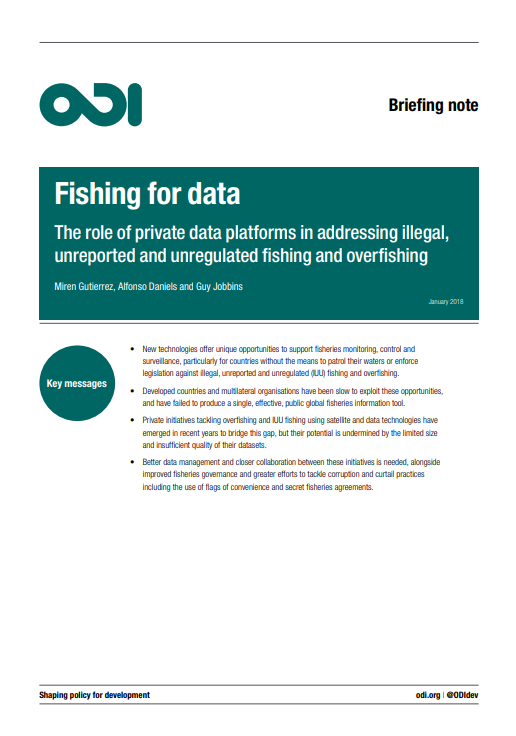Marine fisheries are critical resources for coastal developing countries. They are also difficult to manage sustainably. Almost a third of global fish stocks are degraded from overfishing, and a further 60% are ‘fully exploited’ (FAO, 2016). Illegal, unreported and unregulated (IUU) fishing accounts for a significant amount of this overfishing. The global IUU catch has been estimated at 11–26 million tonnes each year (Agnew et al., 2009), or between 7% and 17% of the total global catch (FAO, 2016). For fish stocks already exploited at – or beyond – their maximum sustainable yield by legal activities, additional pressure from IUU fishing can be the difference between continuing productivity or collapse.
The degradation of fisheries poses risks to the food security and livelihoods of millions of people, as well as undermining local economies. In coastal West Africa, for instance, up to two-thirds of all the animal protein people eat comes from fish, and around a quarter of jobs are linked to fisheries (Copeland, 2014). According to one recent report, IUU fishing costs just six West African countries a combined $2.3 billion in revenue each year (Doumbouya et al., 2017), almost 15% of their combined gross domestic product.
Global IUU catches are worth an estimated $10–$24 billion each year, and mainly target high-value species (Agnew et al., 2009). The potential profits create strong incentives for illegal behaviour, particularly in areas with weak governance and low enforcement capacity (Standing, 2017). Increasingly effective fisheries monitoring, control and surveillance (MCS) in the global north means that most of the IUU catch is taken by foreign vessels in the domestic waters of developing countries (Annan, 2016). Effective enforcement is made more difficult by the international aspects of the crime; seizing individual vessels does not disable the international criminal networks that finance and coordinate IUU fishing because they are protected by layers of opacity, operating under secret agreements and flags of convenience.
Against this challenging background, technology has the potential to support fisheries MCS. While developing countries may have limited physical assets – such as patrol vessels – for enforcement, satellite imagery and big data infrastructure may offer cost-effective ways to increase the efficiency of MCS and enforcement efforts (Cordes and California Environmental Associates, 2015).
The expansion of commercial satellite services has enabled new remote sensing technologies that support fisheries MCS. Vessels fitted with communications equipment such as vessel management systems (VMS) and automatic identification systems (AIS) broadcast data on their location and movements. In principle, these systems enable new forms of real-time surveillance of fishing fleets and support vessels. Analysis of historic AIS and VMS data may also identify patterns and trends in vessel movements that indicate IUU fishing activities. Coupled with analysis of national and international registries of vessels, this could help identify specific vessels, operators and owners associated with IUU activity. Together, remote sensing and big data techniques can support long-term criminal investigations and real-time MCS and enforcement.
Governments in developed countries and multilateral organisations have been slow to exploit these opportunities, and have failed to produce a single, effective, public global fisheries information tool. The Food and Agriculture Organisation (FAO), for example, maintains the Fishing Vessels Finder register, which as of 2015 contained 238,689 fishing vessels – a fraction of the 4.6 million currently operating in the world, according to FAO’s own estimates. Several private and charitable initiatives have set out to bridge this gap, and have attracted significant interest and investment.3 This briefing note reviews the five main existing initiatives. Detailed questionnaires were sent to them and they all replied. The aim of the note is to provide guidance on the private fisheries big data tools available and their strengths and weaknesses for developing countries whose fisheries are being ravaged by foreign trawlers, but which lack the means to patrol their waters and enforce existing legislation.
The authors conclude that these big data platforms are complementary, and could potentially be extremely useful in addressing IUU fishing and overfishing in the waters of developing countries. But they have several weaknesses, including the limited size of their databases and their use of algorithms that are incapable of accurately identifying fishing behaviour. Despite their shortcomings, these platforms are seeking to occupy this market space, often offering their services to governments and international and regional organisations in an attempt to crowd out the rest, with insufficient attention given to the robustness of their datasets. Even if these issues were addressed, new technologies cannot substitute for the political will to address institutional and methodological weaknesses in the sector. In short, technology – without cooperation, strategising and the right policies in place – is not going to solve the problem of IUU fishing and overfishing on its own.

